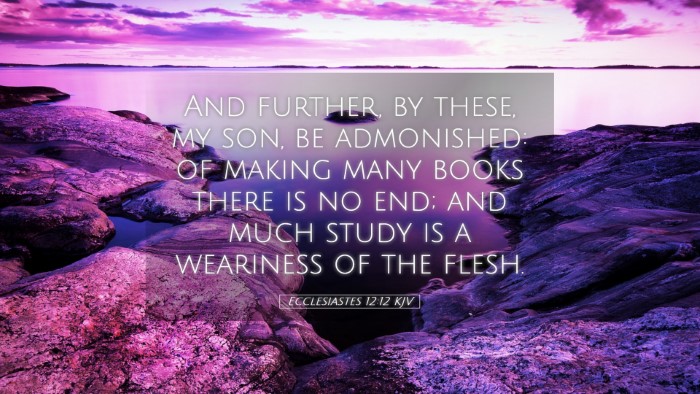Old Testament
Genesis Exodus Leviticus Numbers Deuteronomy Joshua Judges Ruth 1 Samuel 2 Samuel 1 Kings 2 Kings 1 Chronicles 2 Chronicles Ezra Nehemiah Esther Job Psalms Proverbs Ecclesiastes Song of Solomon Isaiah Jeremiah Lamentations Ezekiel Daniel Hosea Joel Amos Obadiah Jonah Micah Nahum Habakkuk Zephaniah Haggai Zechariah MalachiEcclesiastes 12:12
Ecclesiastes 12:12 KJV
And further, by these, my son, be admonished: of making many books there is no end; and much study is a weariness of the flesh.
Ecclesiastes 12:12 Bible Commentary
Commentary on Ecclesiastes 12:12
Ecclesiastes 12:12 (KJV): "And further, by these, my son, be admonished: of making many books there is no end; and much study is a weariness of the flesh."
Contextual Overview
The book of Ecclesiastes is traditionally attributed to Solomon, who reflects on the meaning of life and the futility of human endeavors. In this closing chapter, the Preacher summarizes key themes with a focus on wisdom and the limits of human understanding. Ecclesiastes 12:12 serves as a cautionary reminder about the pursuit of knowledge and the nature of wisdom.
Historical and Theological Insights
This verse encapsulates vital insights regarding the nature of wisdom literature in the Old Testament. It highlights the tension between the quest for knowledge and the practical implications of acquiring that knowledge.
- The Pursuit of Knowledge: Shifting attention from the accumulation of books to a more discerning approach towards wisdom.
- Limitations of Human Effort: Acknowledgement that regardless of the volumes of books, true understanding is not guaranteed through mere study.
Commentary Insights
Insights from various public domain commentators enhance our understanding of this passage:
-
Matthew Henry:
Henry emphasizes the sufficiency of God’s wisdom compared to human efforts. He points out the weariness and futility that come with endless study. In his view, this verse urges believers to seek wisdom that leads to joy and fulfillment rather than mere knowledge.
-
Albert Barnes:
Barnes notes that making many books is a relentless effort, indicating a societal tendency toward continuous learning without practical application. He warns that this can become burdensome and even detrimental to spiritual growth, encouraging readers to focus instead on the essential truths of faith.
-
Adam Clarke:
Clarke elaborates on the idea that while books and study are beneficial, they should not overtake one’s life, leading to exhaustion. He advocates for balance in the pursuit of knowledge, positing that it is essential to align scholarly efforts with divine revelation and wisdom found in Scripture.
Applicational Themes
This verse holds significant relevance for modern readers, especially pastors and students of Scripture:
-
The Balance of Knowledge:
It serves as a warning against becoming overwhelmed by scholarly pursuits. Instead, it invites believers to find contentment and clarity in the truths of the Bible.
-
The Nature of True Wisdom:
True wisdom comes from God rather than exhaustive study. This encourages readers to seek divine insight through prayer and the guidance of the Holy Spirit.
-
Cultivating Spiritual Discernment:
Believers are encouraged to cultivate discernment in their studies, focusing on material that edifies their faith and leads to practical living rather than sheer intellectualism.
Conclusion
Ecclesiastes 12:12 stands as a pivotal verse that challenges both scholars and laypeople alike to assess the nature of their pursuit of knowledge. It beckons a move away from a mere accumulation of facts toward a relationship with God founded on wisdom. By heeding the admonitions of this scripture, one can find a balance that honors both intellect and spirituality, recognizing that the ultimate aim of knowledge within the Christian faith is to draw closer to the Creator.


